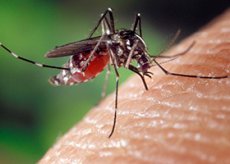New publications
Turns out mosquitoes can be vindictive
Last reviewed: 02.07.2025

All iLive content is medically reviewed or fact checked to ensure as much factual accuracy as possible.
We have strict sourcing guidelines and only link to reputable media sites, academic research institutions and, whenever possible, medically peer reviewed studies. Note that the numbers in parentheses ([1], [2], etc.) are clickable links to these studies.
If you feel that any of our content is inaccurate, out-of-date, or otherwise questionable, please select it and press Ctrl + Enter.

Mosquitoes have the ability to remember both the smell of specific people and the circumstances in which they met.
In the fight against mosquitoes, we often use all sorts of means - from electric fumigators, ointments and scented candles to searching for insects and getting rid of them "by hand". A slipper, a newspaper, or just a palm can be used. Some people get rid of the "bloodsucker" right away, while others spend more than one hour searching for the mosquito.
But, as it turned out, even slapping at mosquitoes "in vain" can seriously scare the bloodsuckers. This is the conclusion reached by specialists representing the University of Washington (Seattle). Scientists have discovered that mosquitoes have the ability to remember circumstances and associate them with a certain human scent. If the circumstances were dangerous for the insects, then in the future they will "stay away" from the corresponding smell.
Scientists conducted the following experiment. Female yellow fever mosquitoes were "introduced" to different aromatic compositions - in particular, to individual human body odors. When presenting certain scents, the specialists included mechanical twitching and vibrations that were unpleasant for the insects. Such vibrations are created, for example, by clapping your hands or hitting a wall. After 24 hours, the insects were sent into a closed space where the mosquitoes had to make a choice: to fly to the left or to the right. From one side, the insects were exposed to a scent that they associated with unpleasant mechanical vibrations. Surprisingly, in all cases, the mosquitoes went in the opposite direction without thinking. Therefore, the insects sensed potential danger and did everything to avoid it, despite the fact that a “delicious” human scent was being emitted.
Scientists also determined that the mosquito brain is capable of “discerning” scents. A kind of flight simulator was developed for the mosquitoes: the insects were given the illusion of flying, during which they sensed various smells. At the same time, the scientists monitored the behavior of individual groups of nerve cells in the brain. As it was discovered, dopamine
was of great importance in insects. Specific dopamine-dependent neuronal chains helped distinguish and identify aromas. Moreover, this applied to both unpleasant memories and positive ones. Due to the diversity of human aromas, mosquitoes are able to remember who is dangerous to them, and who, on the contrary, is of interest.
So far, experts have not been able to answer the question of what specific aromatic features can attract insects. Even the scent of one person can include more than four hundred components. Probably, not all aromatic components are essential for insects. However, mosquitoes clearly know how to separate a “safe” person from a “dangerous” one, ultimately choosing the one who will not chase with a newspaper in hand.
More details about the experiment can be found on the pages of Current Biology.
